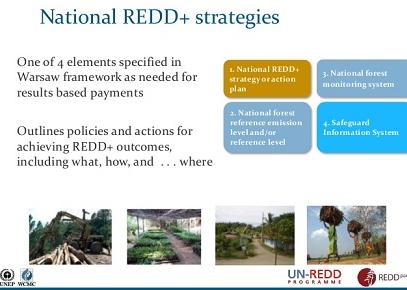What is Reducing Emissions from Deforestation and Forest Degradation (REDD)?
- REDD is set of steps designed to use market and financial incentives in order to reduce emissions of greenhouse gases from deforestation and forest degradation.
- It is collaborative programme of Food and Agriculture Organization (FAO), United Nations Development Programme (UNDP) and United Nations Environment Programme (UNEP).
- Its original objective is to reduce greenhouse gases but it is claimed that it can deliver co-benefits such as biodiversity conservation and poverty alleviation.
What is REDD+?
- REDD+ initiative goes beyond deforestation and forest degradation, and includes the role of conservation, sustainable management of forests and enhancement of forest carbon stocks.
- It aims at reducing emissions from deforestation and forest degradation, conservation of forest carbon stocks, sustainable management of forests and enhancement of forest carbon stocks in developing countries.
- It gives emphasis to activities that will help in sustainable livelihood of local communities and also in conservation of biodiversity.
National REDD+ Strategy
- It aims at achieve climate change mitigation by incentivizing forest conservation.
- This strategy will soon be communicated to United Nations Framework Convention on Climate Change (UNFCCC).
- It has been prepared by Indian Council of Forestry Research & Education (ICFRE), Dehradun.
- It is one of tools to further supplement India’s commitment to 2015 Paris agreement.
- It will support empowerment of youth cadres as community foresters to lead charge at local level.
- Under it, Green Skill Development programme will be launched for imparting forestry-related specialised skills among the youth.
- Significance:
- National REDD+ strategy will help India to fulfil its nationally determined contribution (NDC) commitments and will also contribute to livelihood of forest dependent population.
- It will help to enhance efforts for forest conservation and enhance productivity of forest eco-systems.
- It takes into consideration important role played by tribal, other forest dwelling people and society as whole in reiterating India’s commitment to Paris Agreement.
Why REDD+ is important?
- Paris Agreement on Climate Change recognises role of forests in climate change mitigation and calls upon participating nations to take action to implement and support REDD+.
- India in its NDC to this agreement has committed to capture 2.5 to 3 billion tonnes of carbon dioxide (CO2) through additional efforts in forestry sector.
- India’s first biennial update report to UNFCCC has revealed that forests in India capture about 12% of India’s total GHG emissions.
- Thus, forestry sector in India is making positive cost effective contribution for climate change mitigation.
